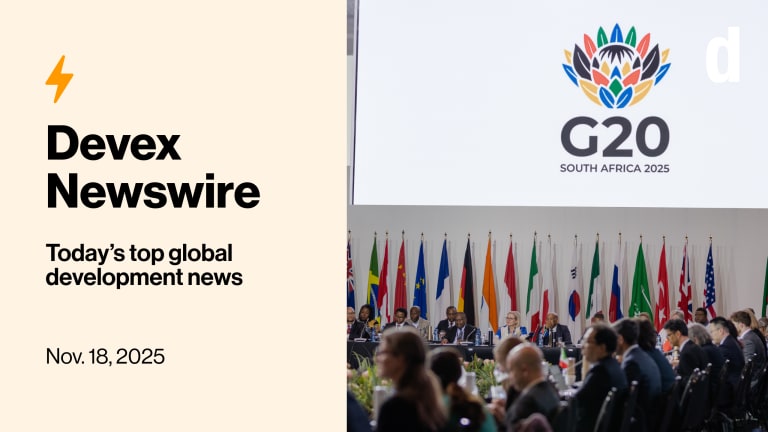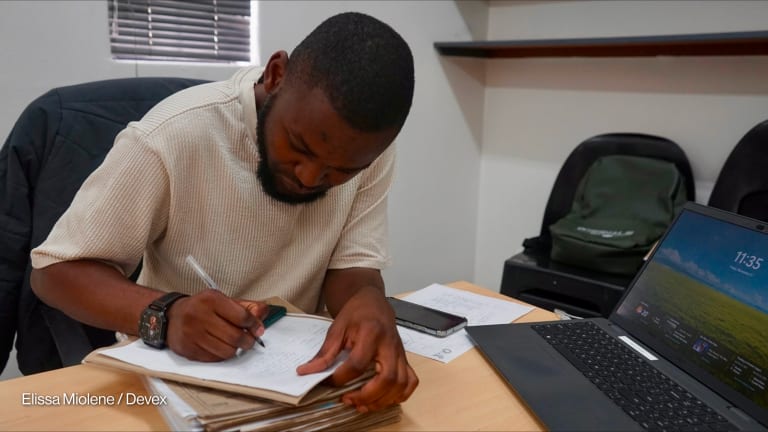Still delicate: South Africa's shift from DfID beneficiary to partner

The U.K. Department for International Development has denied — once more — that its 2013 decision to end bilateral aid to South Africa was “ad hoc” and politically motivated.
In response to the U.K. parliamentary committee for international development, whose members had questioned the timing of the announcement — which came in May last year, prior to local elections — and whether the decision was based on a “robust” enough review, DfID replied that its decisions are “based on detailed reviews of need and likely effectiveness of [the agency’s] development assistance in a country.”
“Bilateral programs are kept constantly under review allowing DfID to respond to any changes in circumstance,” said an official statement published on Friday.
U.K. Secretary of State for International Development Justine Greening announced the end of bilateral programs in India and South Africa 18 months and two years respectively after an extensive review process, under which the decision had already been made to cut aid programs in 16 countries by 2016.
This narrowing of focus from 43 countries down to 27 — now 28, after South Sudan won independence in 2011 — ended programs in both middle-income countries including China and Russia, as well as low income-countries including Burundi and Angola.
According to DfID, these decisions were based on need, potential impact of assistance and strategic fit with its priorities, including a focus on fragility.
READ: South Africa: UK aid withdrawal prompts donor diversification
Timing, politics, diplomacy
The later announcements on India and South Africa met with criticism, including from opposition MP Ivan Lewis — Shadow Secretary of State for International Development at the time — who saw this as seeking “cheap headlines.”
In January 2014, MPs recommended that decisions to end or start a bilateral program should only be made as part of a comprehensive review.
Commenting at the time, Sir Malcolm Bruce, chair of the international development committee said: “We believe there is a rationale for funding bilateral programs in some middle income countries while ending them in others. However, we have concerns about the timing of the decisions and, in particular, that they are neither methodical nor transparent, but related to short-term political pressures.”
DfID’s response published on Friday rejected this. And while the agency’s latest move might placate British foreign aid skeptics — all the more so in the wake of severe flooding in parts of the U.K. that led to calls for the aid budget to be brought home — it may cause concern among partner countries that a precedent has been set for swift decisions on cooperation.
The announcement last May also caused tension with the South African government, which claimed they had not been properly consulted, though this was again denied by London.
The argument in favour of ending aid to stable MICs is all the more pertinent in a country considered Africa’s economic powerhouse and where U.K. aid is relatively low, currently averaging just 19 million pounds per year after a peak of 40 million pounds in 2003.
Though the country may still face huge development challenges — with over 50 percent youth unemployment and a life expectancy of just 53 years — bilateral aid, according to DfID in written evidence submitted to the committee, should no longer be the primary means to address these. Instead, other mechanisms, including partnerships with other U.K. departments, “small amounts of targeted technical assistance,” and multilateral channels would be more appropriate.
But the continuing disagreement at Westminster reflects the broader question of managing any exit from aid without damaging relationships — and beneficiaries.
As Duncan Green, strategic advisor at Oxfam GB, commented last May, “aid should bequeath a legacy of trust and friendship” between the partners, and “ending the aid relationship should be a moment of mutual celebration, not public mud-slinging.”
READ:Amid DfID’s pullout from South Africa, will other donors follow?
South Africa, India as development hubs
Meanwhile, the widespread poverty and inequality in South Africa, according to Oxfam, meant that U.K. aid was “still a lifeline for poor people,” such that the two countries would need “a concrete plan to make sure the poorest people get the help they need” after 2015.
DfID is expected to retain its Pretoria office to manage regional programs — worth just under 60 million pounds in the current financial year — covering trade integration and economic growth, climate change adaptation, and health. These target various regional groupings, depending on the issue, of up to 26 countries.
Friday’s response to the committee further highlighted the role of both South Africa and India in supporting development in other countries.
“In South Africa, the U.K. will continue to work with the country for development results elsewhere on the continent — for example, DfID is already working in new ways alongside HM Revenue and Customs to help the South African Revenue Service to strengthen customs and tax systems in other African countries,” read DfID’s statement.
This support comes under DfID South Africa’s Global Development Partnerships Program, which is worth around 4 million pounds in the current financial year and also includes the sharing of DfID expertise with the new South African Development Partnership Agency.
Until its closure in 2015, the U.K.’s bilateral aid program aimed to help three million more people start or expand their businesses and to reduce the number of women dying in childbirth by more than 10 percent.
Are you in South Africa? How do you see the future partnership with the U.K. — and what role should South Africa play in regional aid programs? What does an ideal exit strategy look like? Please let us know by leaving a comment below or sending us an email to news@devex.com.
Read more development aid news online, and subscribe to The Development Newswire to receive top international development headlines from the world’s leading donors, news sources and opinion leaders — emailed to you FREE every business day.
See more:
Search for articles
Most Read
- 1
- 2
- 3
- 4
- 5








